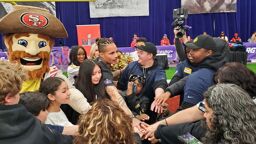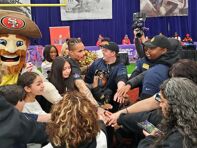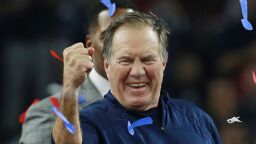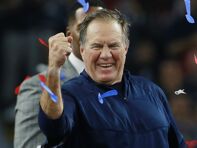I’ve wanted to play football since I was in elementary school.
I begged my parents to let me play, but because I was assigned female at birth, I was not allowed. I tried my hardest to convince them to let me play, including breaking all of my NFL pencils that I loved in protest, but it didn’t work.
Instead, I ended up playing fast-pitch softball and becoming a catcher, the toughest position on the field.
One of the hard things about growing up as a “tomboy,” sporting short hair for much of my life, and playing softball, was that many people assumed I was a lesbian. I knew for sure I wasn’t, as I always liked guys, but because of how I looked and acted, the guys never seemed to like me.
I also never felt comfortable in my own skin, especially once puberty hit. It wasn’t until 2015, as a 27-year-old, that my therapist helped me come to the realization that I am a trans male.
I wasn’t sure how to exist in this society where gender is so polarized, but I have found solace in the trans and LGBTQ+ community. I suddenly had a connection to this whole new group of people that I never wanted to identify with before.
Not only did I come out as transgender, but also as a gay male. I read up on everything I could about the LGBTQ+ community and the resources available in my area of Connecticut, finding that I had to travel at least 45 minutes to get to any kind of support group or anything LGBTQ+ related.
I started attending a couple of different support groups, where friends quickly became family. It felt so easy to form bonds with my new friends because of all the mutual experiences we shared. Forming these friendships was something that was never easy for me before, as I have struggled with social anxiety for most of my life.
After having top surgery in February of 2016, then starting hormone replacement therapy that March, I was really beginning to live life authentically for the first time.
Something was missing though. I had always been an athlete, and I missed being part of a team and playing competitive sports. I started searching the internet for LGBTQ+ sports leagues and came across the New York Gay Football League. I couldn’t believe it! This could be my chance to finally play football! I decided in the fall of 2017 to join the league. I knew driving from Connecticut to New York City every weekend would be a lot, but in my mind it was totally worth it. There was no league like this in Connecticut.
I was drafted to the green team, sponsored by “Mr. Biggs,” a sports bar in Hell’s Kitchen. I will never forget the night of my first game, and putting on that jersey for the first time. I looked in the mirror and could not stop smiling. I remember getting to the field and being greeted by teammates and players from other teams, and everyone was so welcoming and kind.
When I was with my teammates, I felt like just another one of the guys. They took me in and it was like I suddenly was a part of this huge family.
The fact that I am trans didn’t matter to them. I was just another gay guy, playing in the New York Gay Football League, and it felt amazing. I will never forget the first points I scored, which came on an extra point after a touchdown, and how happy the rest of my team was for me.
I earned the nickname “special teams,” as I ended up scoring quite a few extra points throughout the season. It didn’t take long at all to bond with my teammates and many of the players throughout the league. We would all go out together after the games, sometimes hanging out at one of the guy’s apartments for a bit before heading to whatever bar had sponsored that night.
My anxiety makes it hard for me to socialize, but the guys always included me, helping me feel more comfortable.
Not only do I struggle with anxiety, but I also have major depression, and when it was getting close to time for the next fall season of the NYGFL season to start, it hit me really hard. I was in a really dark place, contemplating suicide, and ended up in the hospital.
Thinking about playing football with my NYGFL family again was instrumental in keeping me alive.
It was getting close to time to register for the season, and I panicked because I did not have access to the internet. I explained to my doctor how important this league was to me, how it gave me something to look forward to. It gave me hope. Thinking about playing football with my NYGFL family again was instrumental in keeping me alive. The doctor allowed me to register from the hospital, and I was released in time for the start of the season.
This time I was drafted to the grey team, sponsored by the famous “Stonewall Inn,” site of the famous riots that helped propel the LGBTQ+ rights movement. This was another great group of guys who immediately took me in and became part of my family.
It was only my second season, but it felt like I had known the guys in this league for many years. That season gave me something to look forward to every week, and the support and friendship I needed to get through that major depressive episode.

I loved being around the guys and playing this awesome sport so much that I decided to play that Spring season because I couldn’t wait a whole year to play again. I joined the yellow team, “DBL” (Dive Bar Lounge), and had a season I’ll never forget. By that time, I knew not only all my former teammates but most of the guys in the league, and it was great being able to hang out with them every weekend.
I also knew, however, that at the end of the season I’d be moving to Florida with my family to be near my younger brother and my brand new nephew. I made the most of it and spent as much time with the guys as I could. I will never forget my last game in the NYGFL. My captain and quarterback called plays to get me the ball as much as he could, and I even came a few yards shy of scoring my first touchdown!
After the game the opposing team even did a cheer for me, knowing it was my last game with them. My captain made cupcakes for the occasion, and my team signed a jersey and football for me to take to Florida with me. I was so touched, and honored to be a part of this family. These guys truly cared about me, and it was really difficult to have to leave.
Before leaving for Florida, I researched the area to see if there was a football league like the NYGFL close to where I’d be living. Luckily, I was moving to South Florida, not far from Wilton Manors and Ft. Lauderdale, home of the South Florida Flag Football League. I got connected with their Facebook page and started making connections before I even moved.
I got involved as soon as I could. I was thrilled to know that I’d have another group of guys to get to know and play football with. This was another close knit group that felt immediately like family.
In Florida, not only did I play in the regular season, but I also had the opportunity to join the Sharks, one of the travel teams that was preparing to go to the Gay Bowl. In 2019, the Gay Bowl happened to be in none other than New York City! So it was not just my first Gay Bowl but also a homecoming for me.
It was an incredible experience going to the city with my new South Florida family, playing against teams from all over the country, and seeing my NYGFL family again.
I now have the biggest extended family ever, who support me unconditionally on my journey to living as my authentic self.
I will never forget at the end of the closing ceremonies, the venue had cleared out except for the NY guys, and they decided to take a picture on stage together. I was standing there looking on, and they called me up with them, saying, “come on up Caidin, you’re one of us!”
These experiences have been an amazing welcoming into the LGBTQ+ community. I now have the biggest extended family ever, who support me unconditionally on my journey to living as my authentic self.
I want to thank the NYGFL and SFFFL for being there for me and accepting me into your families. You all continue to hold a special place in my heart, and I am so grateful to know all of you.
You can follow Caidin Thomas Smith on Instagram @caidin5, or on Twitter @caidinsmith.
You can find the New York Gay Flag Football League on Facebook, and you can find the South Florida Flag Football league on Facebook as well.
Story editor: Cyd Zeigler
If you are an out LGBTQ person in sports and want to tell your story, email Jim Buzinski ([email protected])
Check out our archive of coming out stories.
If you are considering suicide, LGBTQ youth (ages 24 and younger) can reach the Trevor Project Lifeline at 1-866-488-7386. You can also contact the National Suicide Prevention Lifeline at 1-800-273-8255 24 hours a day, and it’s available to people of all ages and identities. Trans or gender-nonconforming people can reach Trans Lifeline at 877-565-8860.







































